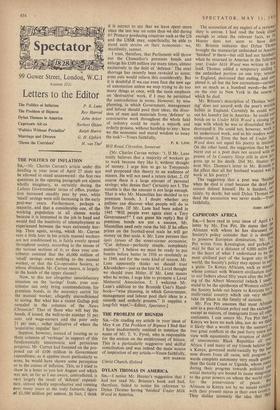Letters - to the Editor
The Politics of Inflation The Problem of Bigness Dylan Thomas in America Capricorn Africa 'Politics Without Prejudice' Marriage and Divorce 'Down the Corridors'
P. R. Lane Roy Harrod John Arlon Norbert Okare Ralph Harris G. H. E/phick H. van Thai
THE POLITICS OF INFLATION SIR,—Mr. Charles Curran's article under this heading in your issue of April 27 must not be allowed to stand unanswered: the first two questions in the opening paragraph are almost wholly imaginary, as certainly during the Labour Governments' terms of office, produc- tion increased steadily year by year, while 'small' savings were still increasing in the early post-war years. Furthermore, perhaps a majority, and that a considerable one, of the working population in all classes works because it is interested in the job in hand and would find the inactivity of uriemployment as experienced between the wars extremely bor- ing. Then again, saving, which Mr. Curran says a little later in his article manual workers are not conditioned to, is fairly evenly spread throughout society, according to the means of the various sections of it; or does your con- tributor contend that the £6,000 million of 'small' savings owes nothing to the manual worker, or that the Co-operative Society, at whose dividends Mr. Curran sneers, is largely in the hands of the upper classes?
Now, to this not altogether unsatisfactory situation on the 'savings' front, your con- tributor can only bring commendations for premium bonds, as the necessary carrot for the manual worker, allegedly unconditioned to saving. But what has a recent Gallup poll revealed in the columns of the News Chronicle? That of those who will buy the bonds, if issued, the well-to-do number 51 per cent. and wage-earners and the poor only 21 per cent.: rather indicative of where the 'acquisitive impulse' lies!
Suppose, however, instead of treating us to three columns of 'verbiage' in support of this fundamentally uneconomic and pernicious proposal, Mr. Curran had fastened on the pro- posed cut of £100 million in Government expenditure, as it applies more particularly to arms, he would have shown some perception as to the causes of inflation. This, as 1 tried to show in a letter to you last August and which was not, so far as I am aware, contradicted, is very largely the result of 'defence' expendi- ture, almost wholly unproductive and running over many years at the truly fantastic figure of £1,500 million per annum. in fact, I think it is correct to say that we have spent more since the last war on arms than we did during it! Primary producing countries such as the US and the USSR may, superficially, be able to stand such strains on their economies : we, manifestly, cannot.
I trust, therefore, that Parliament will throw out the Chancellor's premium bonds and enlarge his £100 million cut many times, almost exclusively in the field of 'defence.' The steel shortage has recently been revealed as acute; arms cuts would relieve this considerably. But it is doubtful if we.can even face the new age of automation unless we stop trying'to do too many things at once, with the main emphasis on 'destructive' work, if I may be permitted the contradiction in terms. However, by wise planning, in which Government, management and labour should pool their ideas, the diver- sion of men and materials from 'defence' to constructive work throughout the whole field of industry could be made a smooth and orderly process, without hardship to any : have we the economic and moral wisdom to 'essay the task?—Yours faithfully,
[Mr. Charles Curran writes: '1. If Mr. Lane really believes that a majority of workers go to work because they like it, without thought of money, I urge him to go to Tonypandy and propound this theory to, an audience of miners. He will not need a return ticket. 2. Of course there is a large amount of personal savings; who denies that? Certainly not I. The trouble is that the amount is not large enough. That is why Mr. Macmillan has decided to try premium bonds. 3. I doubt whether any pollster can discover what people will do in the future. (If Mr. Lane had been asked in 1945 "Will people ever again elect a Tory Government?" I can guess his reply.) But if premium bonds are not a success, Mr. Macmillan need only raise the bid. If he offers prizes on the football-pool scale he will get money on that scale. 4. Mr. Lane pursues that ignis fatuus of the street-corner economist, "Cut defence—perfectly simple, completely painless." I believe we must be ready to put bombs before butter in 1956 as resolutely as in 1940, and for the same kind of reason. Mr. Lane apparently thinks we should trust Khrushchev—just as the late M. Laval thought we should trust Hitler. If Mr. Lane means what he writes, I urge him to promote a Laval Memorial Association. 5. I welcome Mr. Lane's addition to the Bromide User's Hand- book—"wise planning, in which Government, management and labour pool their ideas in a smooth and orderly process." It supplies a long-felt want.'—Editor, Spectator.]


































 Previous page
Previous page